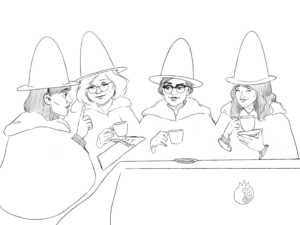I grew up in a small Catholic town in Massachusetts called West Bridgewater. It was a town so out of the way that even the most learned Masshole has probably only stopped there to go somewhere else. As a young and very closeted trans girl, I was taught that my liberal beliefs were a sign of personal weakness, a signal that indicated I was overly invested in emotions. “Liberal pansy” is how the teenage sons of old school Republicans would label those feelings.
Desperate to be seen as an intellectual, I would appeal to my Conservative friends to convince them I was more moderate than they thought. Gaining a modicum of their respect would require a painful sacrifice of my integrity. I would ask them political questions that I already knew the answers to in order to stroke their egos.
One decade later, I wasn’t shocked when my hometown voted for Donald Trump in the 2016 election. His horrifically xenophobic and misogynist platform brought in 2,148 votes, compared to the 1,623 people that showed up for Hillary. Trump took West Bridgewater, Massachusetts by 53.1%.
If you were to measure my trans journey in a scientific experiment, ol’ WB would serve as the control. Traveling to West Bridgewater now is painful. It has barely changed since I moved there back in August 1998, and those changes, like the new CVS across the street from the second Dunkin’ Donuts, seem like literal glitches to me — as if they shouldn’t be there.
The intellectual culture in my town was Republican. Even when I lived in liberal Boston for three years during college, I remained silent when it came to politics, not from choice but out of fear. When politics came up, I would listen and follow along, nodding along even when in disagreement, because I figured they knew more than me.
This is a common practice for a lot of people in America. The elitist language used to talk about politics is yet another form of voter suppression. I am writing to you because I believe in you and know you can talk politics with the best of them. It wasn’t until last year year that I overcame my nerves and started becoming involved. I canvassed for Kevin De Leon, Tony Thurmond, and Gavin Newsom during the California Primaries, and I have every intention to fight for them again during midterms.
Here are five simple things I learned while canvassing the winding streets of the Valley.
1. Advocacy work helps you heal.
I didn’t know any other trans people until I started volunteering with the Los Angeles LGBT Center’s Resistance Squad. We are a rapid response group that has empowered people like me to participate in phone banks, write letters to representatives, and attend legislative visits with our Assembly Members. I have worked alongside powerful queer folks who I am sure will one day hold office and change the world.
What I love about canvassing specifically is that you get to confront current issues head-on. When someone opens the door for you, you are face to face with yet another citizen who feels like they’ve fallen between the cracks, deep down into a pit where their political voice cannot be heard. But that is not so: they have a voice, and you can empower them to rise up.
Sometimes, doing so feels like you’re being tasked with emotional labor; convincing people that it is worth their time to go out there and vote can be like pulling teeth. We spend so much time reading and scrolling past outrages that tensions can get high talking about the changes we need to see. And occasionally, someone might slam the door in your face and you will be left stewing.
But other times, someone will warm your heart. My favorite “yes” came from a very long and difficult conversation with a young man who was not financially stable enough to move out of his parents’ home. He was working in education and felt completely left behind by the system. After delicately pulling him out of his comfort zone, he quickly became overwhelmed and collapsed on the couch.
He admitted that his life was too hard right now for him to focus on politics, and he was not proud of that. What was the good of getting worked up over something he was too small to affect?
His vulnerability caught me a little off-guard, so I became vulnerable too, telling him about why I do this work; I personally cannot rest easy knowing that all I did was vote. I have volunteered and fought alongside too many affected people now to forget them. I told him that I do this work because I have to, and at some point, he realized that maybe voting this one time will ease his anxieties.
I busted my ass that day running around the Valley, making soft appointments with voters who weren’t yet home. Some of these “meetings” were miles out of my way, but I had to go see these people because I believed in them. At the end of the night, I was covered in both running sweat and flop sweat, only able to scavenge eight votes. I would go home that night and update myself on the most recent horrors of our country and while my work was not directly related to those atrocities, I rested a little easier.
Because that boy was going to change history in his own way; he defied the system that didn’t want his voice.
2. We cannot let people stand silent in their oppression.
No one wants our country to be this rife with turmoil and controversy. No one wants to avoid the hard questions with loved ones so we can’t possibly learn something nasty about them.
Speaking as a canvasser, I can truthfully say that I would hate to have strangers turn up on my doorstep and strongarm me into a deeply personal conversation as much as you would, but we are in crisis mode and quite frankly, we don’t have time for anything but concrete decisions. The evil we are up against is too overt for us to be complacent.
Which is why I’m a big fan of deep canvassing. Deep canvassing is when you ask the hard questions and you don’t take maybe for an answer. You dig and you dig until you hit the hit the source.
Sometimes people will lie to you to get you to go away, usually claiming that they need to do their own research. This is tense moment because it requires you to push back.
You might say: well, what is making you hesitant? Oh, well I am right here and I can answer specific questions. I understand that, but I want to put it out there that Gavin Newsom has already pledged to sign the bill that would give school workers access to unemployment over the summer. Stuff like that usually buys you another minute.
Too many injustices are being committed right now; we cannot let people off the hook. We must hold everyone accountable, even if they mean well.
You’re not there to get hurt and worked up; you’re here to empower them, and the more you push back, the more honest your dialogue will be.
Sometimes the voter will go on the offensive and say something incredibly racist or misogynist. “Kevin DeLeon’s shpiel about making his country easier for immigrants to live in is ridiculous. If immigrants like this country so much, they should have to serve in the military first,” one particular asshole said to me after a five minute conversation that felt more like pulling teeth.
But that hatred is not what he wanted to admit. He was hoping to avoid publicizing his racist and xenophobic feelings that he may never have even said out loud. But I pushed him and he had to hear himself say that horrible thing.
Good.
That’s for him to stew in now.
Fortunately, not all conversations that require pushback will end so destructively. Many will bring you to a tough junction between action and silence. “I’m so sick of the negativity in everything right now; we’re just in a Primary election and there is already so much mudslinging and attack ads. I don’t like either of these candidates anymore and I really can’t support them.”
The woman who told me that was surprised to hear that I agreed with her. I was frustrated too, but I acknowledged that we are never going to 100% agree with a candidate, as much as we will never 100% agree with a friend. But sometimes, we only get two choices and not voting is just as bad as lying down.
By the time I left, I was confident that she really would get out there and vote.
Civility is a weapon of white supremacy and while they rule over us in power and wealth, we have so much more heart than they do. As they make things harder and harder, barriers are thrown up that become harder and harder to break, but when you finally break through, you will reach someone, and they will continue the good work.
3. This work is physically and mentally exhausting.
Spending eight hours under the gaze of the hot sun makes it necessary to pre-plan everything. You need to figure out what your public resources are and when you’ll need them. For example, if you’re out there canvassing, you need to know where public restrooms and water are before you start to feel nauseous.
Sometimes you’ll walk one mile out of your way for someone to say yes only to find out they live in an apartment complex. Whether you get in or not can sometimes be a matter of luck. I personally just try to look like I am supposed to be there and someone will likely let me in, but other times it’s nothing going. And their phone number doesn’t work. Or they aren’t home.
Or they slam the door on you. Or getting their vote involves mounting a psychological battle.
But the work is good, so you keep coming back. It’s easy to feel lonely when you are out there and when you come back to base at the end with only a handful of supporters on your list, you wonder how the hell are we going to win back our country?
We will. It doesn’t seem like it, but we will do it because we believe in the work more than they do. To me, it’s a matter of when. When will enough young progressives finally turn up? When will we be able to recruit enough people to pull this off? When will doing this highly emotive and nuanced work be a fiscally responsible decision for a young person?
The answer to all of that is I don’t know and we can’t dig too deep into it. We’re not dreading a crisis anymore; we are in crisis.
Only when we work together can we make the difference. We aren’t knocking on doors to bother anyone, we’re doing it because we need support, and are counting on the affected community to stand up.
4. People will surprise you.
Here’s how it works for people that don’t know: You will get a map to scour for the day. The map is probably just a tiny section of a big city, and you may think that it will not be enough to last you, but you’ll end up becoming very familiar with the territory as you spend the whole day there. In your folder, you’ll have a long list of names, addresses, and voter information; this way you know what you’re getting into with every knock-knock at the door.
Sometimes, you’ll see a Republican on your list and instantaneously panic. You’ll imagine opening the door and the Smoke of Hell billowing out as a scary figure emerges in pure silhouette.
But we need their vote, too. There are two very specific Republican districts being targeted by organizations like Planned Parenthood and the LGBT Center right now in regards to this SCOTUS nomination. If we can’t flip them, we lose the vote.
I spoke with one Republican who claimed that they were so sick of the current leadership that they would vote as Progressive as possible to get us out of this mess. It’s kind of like how Dr. Eggman helps you fight pretty much every Final Boss in a Sonic game.
You have to believe in people so you can do this kind of work. As mentioned above, organization math is underwhelming and we need them. Of course, this can lead to a lot of anxiety and emotional labor. But if you keep yourself open, people really can surprise you. I once did an Aaron Sorkin style walk n’ talk with a half-naked man who definitely just had shower sex with his girlfriend. Not only did we fully talk about the upcoming election, but I also truthfully gained his support.
People want to do good — they just need the extra push to even know what good could mean right now. There’s so many choices, most of us just shut down. That’s what this administration wants from us. I hate myself for internally normalizing so much of what’s going on in politics, but it’s very real. It’s surreal, talking to strangers about these things, but everything coming from the White House is affecting all of us.
On the flippity of people being good, I did talk to a happy gay couple who had just adopted some adorable cats when all of a sudden one of the men stepped forward and said, “Look. We really like guns. We like having them, we like using them. Sorry.” Aaaaaaand door slam.
It happens.
5. You can talk about politics.
On Election Night we were all gathered in a cozy living room, eating pizza and watching the news as the results came in. All the while, political commentators were discussing the race and the differences between candidates. Really though, it was just babble. The same talking points resurfaced again and again, worded slightly differently each time.
Ripped almost straight from our simple talking points sheet, it was apparent that the newscasters were not as intimately familiar with the candidates as they appeared. Nor were the voters. Or even us to an extent.
So many of our conversations are recycled. The reality is that none of us really know what we are doing or saying; we’re just looking for a way out.
You may not know every scandal and policy of your candidate, but you have heart. You have an honest belief that can convince a lot of people to do the right thing. And if they happen to know something you don’t, it’s okay. It’s a learning moment. You’re only human.
Sometimes, the voter who opens the door will sneer at you. They’ll hear the name of your organization and tell you that you’re brainwashed. Or accuse you of being a paid-off shill. Don’t listen to them; they’re insecure and you’re stronger than them.
You’re the one brave enough to go around town and engage in psychological jousting with strangers over history changing politics. If you’re scared of that and it gives you anxiety, that’s okay. Every once in a while during canvassing, I need to give myself a break and listen to the Spongebob musical. Or Mean Girls, if I’m like, really mad.
You don’t have to be the best in this kind of work, you just need to bring your whole self. Believe me: if you’re reading this, you are going to do great out there.
Thanks for going on this journey with me! If you live in the LA area, my volunteer group, the Resistance Squad, is always looking for help. We’re the LA LGBT Center’s Rapid Response Team. We just organized a phone bank to fight for SB 918, a bill that would protect youth experiencing homelessness, a community that is unfortunately 40% LGBT.
Our next action is September 2nd. We will be fighting the SCOTUS nomination. If you want in, check out the LA LGBT Center’s Resistance Squad website here.


